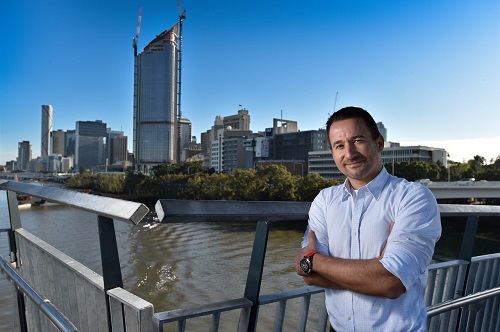
Marcus Foth
Bio:
Professor Marcus Foth
PhD, FACS CP, FQA, MACM Dist., MDIA, JP (Qual.) Qld
Professor of Urban Informatics
QUT School of Design
Queensland University of Technology
Marcus Foth is a Professor of Urban Informatics in the School of Design, Faculty of Creative Industries, Education, and Social Justice, Queensland University of Technology, Brisbane, Australia, and the Course Coordinator of the Master of Design (Strategic Design). He is also a Chief Investigator in the QUT Digital Media Research Centre (DMRC), a founding member of the More-than-Human Futures research group, and a Senior Associate with Outside Opinion.
Marcus’ research brings together people, place, and technology. His current research foci include:
• urban media and geoprivacy;
• data care in smart cities;
• creating better digital futures;
• sustainability and more-than-human futures.
For two decades, Marcus has led ubiquitous computing and interaction design research into interactive digital media, screen, mobile and smart city applications. Since founding the Urban Informatics Research Lab at QUT in 2006, urban informatics has been adopted by industry and universities worldwide. His leadership in establishing the field was recognised in 2017 by the Australian Computer Society inducting him as a Fellow for ‘a sustained and distinguished contribution to the field of computer science’ and by the Australian and New Zealand Governments, which included urban informatics as a new field of research in their 2020 Standard Research Classification.
Marcus has published more than 280 peer-reviewed publications. His h-index is 63 with 13,000+ citations.
In 2023, Marcus was inducted as a Fellow to the Queensland Academy of Arts and Sciences. Since 2021, Marcus has been a member of the national College of Experts of the Australian Research Council (ARC). In 2021, he was also named a Distinguished Member of the international Association for Computing Machinery (ACM) for his outstanding scientific contributions to the field of computing.
The outputs of Marcus’ research have received many awards. For example, the Rapid Analytics Interactive Scenario Explorer Toolkit received the 2021 National Award for Cutting Edge Research of the Planning Institute of Australia for significantly accelerating the calculation of value uplift in linear infrastructure projects such as rail networks. His BeefLedger project was recognised as a 2020 Good Design Australia Award winner twice: in the commercial services category and for design strategy, for demonstrating tangible benefits and impact of blockchain and smart contract applications for industry. Nominated by the Smart Cities Council Australia / New Zealand, Marcus was awarded ICT Researcher of the Year 2017 (Gold Disruptor) by the Australian Computer Society.
Marcus has made substantial contributions to academic service, including being conference chair of OZCHI 2009, Communities & Technologies 2011, and ACM SIGCHI Designing Interactive Systems 2016. He is an active reviewer, associate chair, and editorial board member for various conferences and journals. In recognition of his service, he received the 2018 Publons Peer Review Award (cross-field), which honours the top 1% of reviewers.
Marcus is an ACM Distinguished Speaker and has been giving invited keynote talks and presentations at international conferences and leading research institutions, including Aalto, Aarhus, Harvard, IT University of Copenhagen, KAIST, Ludwig-Maximilians-Universität Munich, MIT, Oulu, Oxford, Politecnico di Milano, Rensselaer Polytechnic Institute, Tongji, Tsinghua.
Available Lectures
To request a single lecture/event, click on the desired lecture and complete the Request Lecture Form.
-
DataCare for Digital Twins: Participatory Data Analytics and the Social Licence to Operate Smart Cities
Data analytics through smart city technology deployments such as digital twins has the potential to create more liveable, sustainable, and equitable cities. However, internationally, there are...
-
Hostile Interaction Design
This talk critically explores the emergence and implications of hostility within interaction design. Drawing parallels to hostile architecture, the talk examines how design choices often...
- Intermediation in Design: Designers as Intermediaries
Design practices often involve grassroots communities and institutional actors with designers working as or with intermediaries. This talk introduces intermediation and suggests the merits of...
- More-than-Human Futures: Connected Urbanism and Cohabitation in the Smart City
The “smart city” agenda is about installing ubiquitous computing infrastructure and IoT devices to drive efficiency and productivity through big data analytics, automation, and...- Non-human Personas: Including Nature in the Participatory Design of Smart Cities
For the past decades humans have been placed at the centre of designing Information and Communication Technology (ICT), leading to the rise in prominence of human-centred design. The field of...- Technology is the least of our concerns: Three provocations in response to the climate emergency
Rising sea levels and more frequent severe weather events are already having major impacts on communities worldwide. Climate change is no longer a future prospect but here and now. The go-to...To request a tour with this speaker, please complete this online form.
If you are not requesting a tour, click on the desired lecture and complete the Request this Lecture form.
All requests will be sent to ACM headquarters for review.
- Intermediation in Design: Designers as Intermediaries
